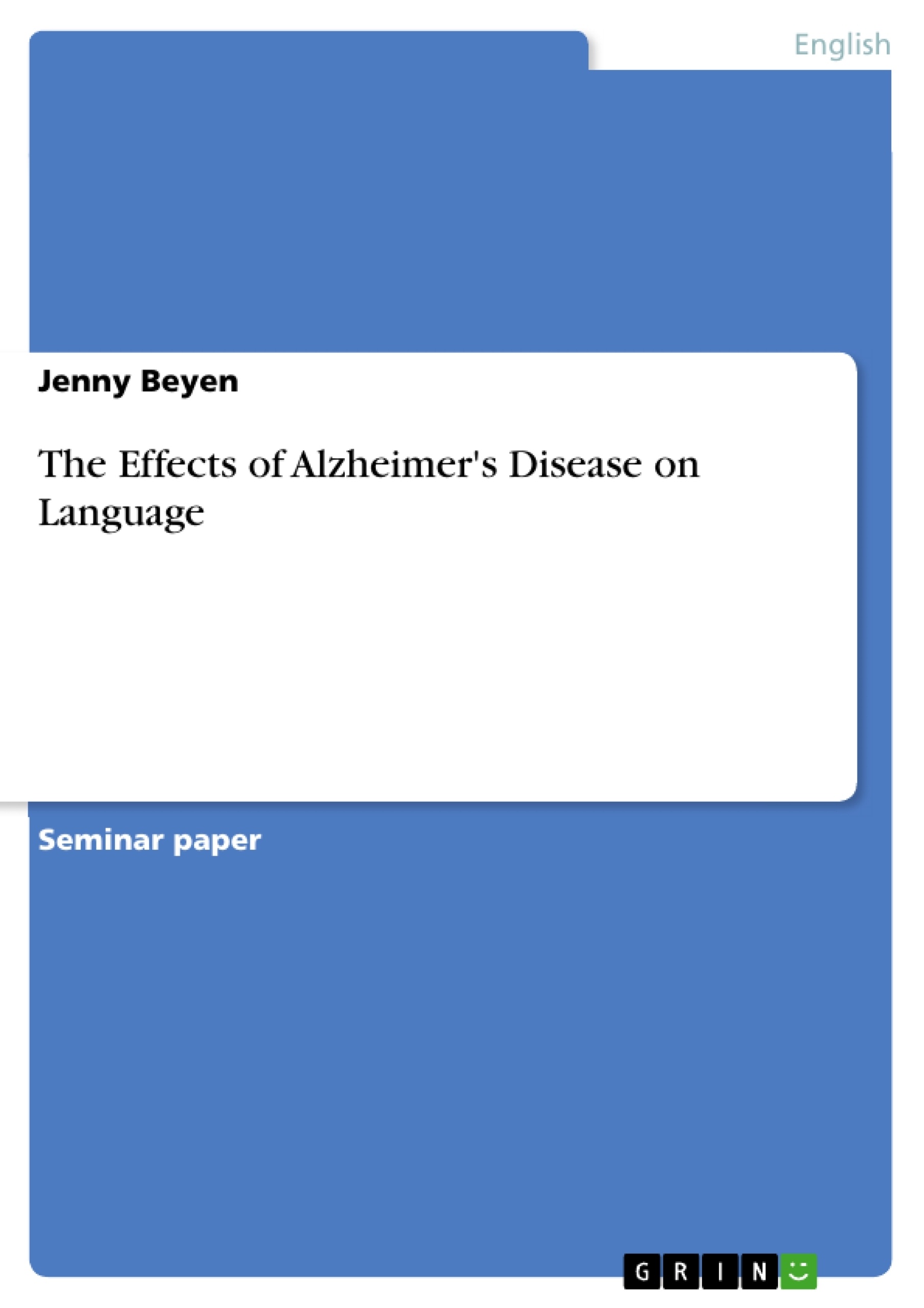Alzheimer's Disease (henceforth „A.D.“) is generally diagnosed in people over the age of 65. So when the world populations becomes older and more persons over the age of 65 populate the world, the disease spreads. By 2006, the number of A.D.-patients had already increased to 26.6 millions. This number is assumed to quadruple by 2050.
But an improved A.D.-research would not only help those persons who suffer from it:
„Alzheimer's Disease offers the challenge not only of delineating the writing disturbance of a common neurodegenerative illness but also the opportunity to discern how widespread neocortical deafferentation affects the neurobehavioral underpinnings of a complex cognitive task such as writing.“ (Glossar et al., 2000:78)
Why especially the examination of language in A.D.-patients can promote the general study of language a great deal is also pointed out by Obler et al. (1999:92):
„The language of dementing patients presents a unique opportunity for examining the relationship between language and cognition. The pattern of dissociation of abilities in dementia can yield information regarding the normal relationship – dependence or independence – between language and more general cognitive abilities. […] To study language production and comprehension abilities in dementing patients is to explore the boundaries between syntax and semantics and among semantics, real world knowledge, and reasoning abilites.“
In this termpaper I will show that A.D. has severe effects on the patients’ language and that it is primarily caused by an impaired memory. During the second chapter, I will give a brief overview of the disease in general, i.e. the history of A.D., the insights and damages of A.D.-patients’ brain and body, and the different stages of this disease. Chapter 3 will present a selection of the most common effects of A.D. on language. The fourth chapter will close with a short summary of the termpaper and a conclusion.
Inhaltsverzeichnis (Table of Contents)
- Introduction
- The Alzheimer's Disease - A medical overview
- A short history of Alzheimer's Disease
- Impairments of body and brain due to A.D.
- The different stages of A.D.
- The effects of A.D. on language
- Writing Impairments
- Semantic/Vocabulary Impairments
- Comprehension and Production Impairments
- Naming Impairments (Anomia)
- Intrusion Impairments
- Impairments of Grammar and Syntax
- Pragmatic Impairments
- Conclusion
Zielsetzung und Themenschwerpunkte (Objectives and Key Themes)
This term paper examines the impact of Alzheimer's Disease (A.D.) on language, specifically focusing on the ways in which the disease affects communication abilities. The paper aims to provide a comprehensive overview of the disease, including its historical context, neurological underpinnings, and its progression through various stages. The paper also delves into the specific language impairments associated with A.D., analyzing how these impairments affect different aspects of communication. Key themes explored in the text include:- The impact of Alzheimer's Disease on language abilities
- The relationship between language and cognition in the context of dementia
- The neurological mechanisms underlying language impairment in A.D.
- The progressive nature of A.D. and its effects on communication across different stages
- The importance of understanding A.D. for both patients and caregivers
Zusammenfassung der Kapitel (Chapter Summaries)
The first chapter introduces the topic of Alzheimer's Disease and its growing prevalence in an aging world. It highlights the significance of studying language impairment in A.D. patients for gaining insights into the relationship between language and cognition. The second chapter provides a medical overview of Alzheimer's Disease, tracing its history from its initial discovery to current understanding. This chapter also examines the physical and neurological impairments associated with A.D., including the progressive decline in cognitive abilities and the deterioration of brain cells. The different stages of A.D. are also discussed, with a focus on the three-stage model. The third chapter explores the various ways in which Alzheimer's Disease affects language abilities. The chapter presents a selection of common language impairments, including writing difficulties, semantic and vocabulary impairments, comprehension and production difficulties, naming issues, intrusions, grammatical and syntactical impairments, and pragmatic issues.Schlüsselwörter (Keywords)
The main keywords and focus topics of this text include Alzheimer's Disease, dementia, language impairments, cognition, memory, communication, neurodegeneration, brain cells, hippocampus, entorhinal cortex, stages of A.D., writing impairments, semantic impairments, comprehension and production, naming impairments (anomia), intrusion impairments, grammatical and syntactical impairments, and pragmatic impairments.Frequently Asked Questions
How does Alzheimer's Disease (A.D.) affect language?
A.D. leads to severe impairments in writing, vocabulary, grammar, and comprehension, primarily caused by deteriorating memory and brain cell loss.
What is Anomia in the context of Alzheimer's?
Anomia refers to naming impairments where patients struggle to find the correct words for objects or people, a common symptom of the disease.
What are the three stages of Alzheimer's Disease?
The disease progresses through early, middle, and late stages, each marked by increasing cognitive decline and more profound language difficulties.
Why is studying A.D. language useful for general linguistics?
It helps researchers understand the boundaries between syntax and semantics and the relationship between language and general cognitive abilities.
Which brain areas are primarily affected by A.D.?
The disease significantly damages the hippocampus and the entorhinal cortex, which are crucial for memory and language processing.
- Quote paper
- Jenny Beyen (Author), 2009, The Effects of Alzheimer's Disease on Language, Munich, GRIN Verlag, https://www.hausarbeiten.de/document/148232


